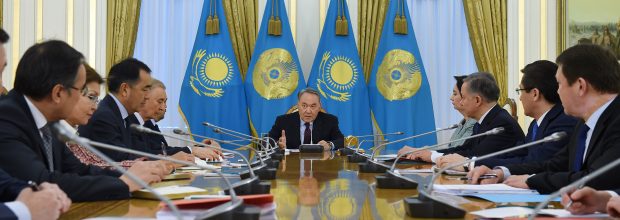
Constitutional Reforms in Kazakhstan

Kazakhstan pushes forward as long-awaited political changes finally occur, which is something new for the region. The change in power in neighboring Uzbekistan in 2016 accelerated the politicization process in Kazakhstan. Thus, discussions on amendments to the constitution and re-distribution of power emerged on the agenda. These processes can be considered as the beginning of important political developments in the region of Central Asia.
On December 15, 2016 President of Kazakhstan Nursultan Nazarbayev proposed to reduce presidential powers in order to empower Parliament and the entire government. Such changes were expected to increase efficiency of the government administration.
On January 11, 2017, a special working group was established on constitutional amendments and the distribution of power. During his public address speech on January 25, 2017, President N. Nazarbayev presented the amendments to be made to the Constitution.
The political reforms expected to be made in Kazakhstan are aimed at reducing the authority of the President and facilitating the political transfer of power in the country. Reforms could ensure the democratization and socio-economic development of Kazakhstan. Recently, the proposed amendments were discussed and endorsed by the Parliament of the country and on March 9, the President of Kazakhstan signed into law the amendments to the Constitution.
In overview, 26 amendments were made to 19 articles of the Constitution along with 35 amendments to other laws. Nearly 35 of the authorities of the President were given instead to Parliament and the government. According to the amendments, the President of the State will deliver 23 presidential authorities to Parliament in the fields of finance, economy, state ownership, and administration.
According to the Constitution, the state government system will be preserved and responsibilities of other branches of power will be increased. All the legislative powers of the President will be given to Parliament. From now on, state programs will be approved not by the President, but by the government (Article 44). This will increase the government’s responsibility for the people and Parliament.
The President is no longer entitled to stop the decisions of the government and the Prime Minister. In addition, the President will cease to have the power to issue decrees that are equal to laws. However, even with this new amendment, the status of the First President of the Republic of Kazakhstan is stated in the Constitution (Article 91). According to the same article, it is emphasized that Kazakhstan’s independence, by principle, cannot be changed in any case along with its unitary structure and territorial integrity.
According to the new amendments, the President of the State appoints only Ministers of Internal Affairs and ministers of Foreign Affairs and Defense. In other words, the President will be responsible for controlling defense and security, and foreign and domestic politics. Future Presidential candidates have to be highly educated. Government members who do not comply with the law may be removed from office by the President (Article 57). The President preserves the right to evaluate activity reports of government members.
The President will nominate the mayor of the capital, governors of “oblasts” (provinces), and major cities. The right to appoint other governors will be given to Parliament. At the same time, the President may remove governors from office.
Parliament is a supreme state body and legislative power that fulfills legislative functions (Article 49). After a Parliament member’s term of office has expired, the member shall resign from Parliament, not the President (Article 70). Parliament will be empowered with additional powers to control the government’s activities. The government will inform the Parliament of all its decisions and activities by the submission of reports. Parliament will play an essential role in the shaping of the cabinet. Government’s responsibilities and authorities in economy management will increase and the cabinet of ministers will be more active and mobile.
In addition, the role of Supreme Court will be strengthened. According to the proposal by the People’s Assembly of Kazakhstan, “interfaith harmony” will be protected at the Constitutional level as an unchangeable principle (Article 39). “Astana International Finance Center” will have status with special legal protection, though this article has been criticized by some lawyers for giving a number of extraordinary rights to the center. The only article that caused severe debates in society was Article 26, which meant to bring amendments to property rights. Although the legalization of this article has been postponed for an indefinite period, this would trigger some challenges or unexpected reactions from some people in the future.
Those who commit terrorist crimes will be deprived of citizenship by a court ruling. Operating procedures of international agreements in the country will be stipulated in the national legislation.
However, some local analysts argue that political imbalance in the country will last as long as the new reforms have not been completed. According to such analysts, the backbone of the amendments is that “the basic essentials of state power system will not change”.
Although constitutional reforms were made in a very short time compared to other countries, it is an important and symbolic historical change in Kazakhstan’s political development. For the first time, the country witnessed the redistribution of powers in the regime. This process was essential for the democratic and political development of the region as well as for the domestic situation in Kazakhstan. The reforms would stabilize social tensions, especially those caused by systematic problems in the country.
These reforms will also be beneficial for further development of relations with the Western democratic countries in terms of attracting foreign investments. It is also a necessary step for the resolving of pressing internal challenges, influenced by the socio-economic effects of price decline in world energy markets. Thus, the formal and legal basis for social and political changes was laid down in the country. One should state that Kazakhstan is on the verge of a new political and historical turning point. Indeed, Kazakhstan needs and deserves a start of a new and different period of active development.


